27 November 2025, Colombo – A transformative South-South Cooperation initiative between the Ministry of Agriculture and Rural Affairs (MARA) of China, the Food and Agriculture Organization of the United Nations (FAO) and the Ministry of Agriculture of Sri Lanka has delivered remarkable results in strengthening Sri Lanka’s fruit value chains. The two-year project, which ended this year, was implemented in collaboration with the Chinese Academy of Tropical Agricultural Sciences (CATAS) and achieved significant productivity, quality, and capacity gains for banana, mango, and pineapple production across ten model farms established in Colombo, Kurunegala and Anuradhapura districts.
Key achievements include:
- Boosting productivity: Pineapple yields tripled to 55 t/ha with high density planting of 25,000 – 32,000 plants per acre, versus 4,000 plants per acre traditionally.
- Improving quality: Advanced pruning and fruit bagging techniques increased export-grade mango production to 90 percent.
- Cutting costs: Banana tissue cultured seedling production doubled, with costs reduced by 30 - 40 percent.
- Building capacities: Over 2,000 farmers and officers were trained at 10 model farms and six training videos were produced and integrated into national training curricula, supporting the long-term dissemination of improved practices.
A landmark achievement was the establishment of a state-of-the-art Banana Tissue Culture Laboratory at the North Central Provincial Department of Agriculture. This facility supplies disease-free, high-yielding planting materials to farmers across three provinces, reducing dependency on distant suppliers, lowering transport-related losses, and ensuring consistent access to affordable, quality inputs.
Inclusive and Sustainable Impact
The project placed strong emphasis on inclusivity, with women comprising 40 percent of trained beneficiaries. Targeted training addressed gender-specific challenges in agriculture, ensuring women farmers gained equal access to new technologies and practices.
The introduced technologies are being integrated into official training curricula and approved through national technology evaluation committees, ensuring institutional uptake and scaling.
“China is proud to partner with Sri Lanka in advancing agricultural innovation through this South-South Cooperation initiative. By sharing knowledge and technology, we are helping farmers achieve higher yields, better quality, and stronger livelihoods. said H E Qi Zhenhong, Ambassador of the People’s Republic of China to Sri Lanka.
The initiative has also become a model for South-South Cooperation, inspiring similar partnerships in the region. Technical protocols and innovations developed in Sri Lanka are now being adapted for use in other developing countries facing comparable agricultural challenges.
“The success achieved in Sri Lanka is not only improving the lives of farmers today but is also shaping a stronger, more resilient fruit value chain for the future. FAO looks forward to building upon these successes in close partnership with the Government and private sector stakeholders, including the country’s fruit farmers, to ensure sustainable growth and resilience in the sector.” said Vimlendra Sharan, FAO Representative for Sri Lanka and the Maldives.
“This initiative directly supports Sri Lanka’s Food Production Programme and strengthens our national capacity to meet future food security challenges. By empowering farmers with the latest knowledge and tools, we are improving productivity today and securing the long-term sustainability of our fruit sector,” said Mr D. P. Wickramasinghe, Secretary, Ministry of Agriculture.
Speaking on the initiative, Ms. Dong Moli, Division Director of the Department of International Cooperation, Ministry of Agriculture and Rural Affairs of China said, “These achievements clearly demonstrate that South–South Cooperation is not only a channel for technology transfer but also an important pathway for building a country’s own development capacity, fostering knowledge sharing, and promoting multiple benefits.”
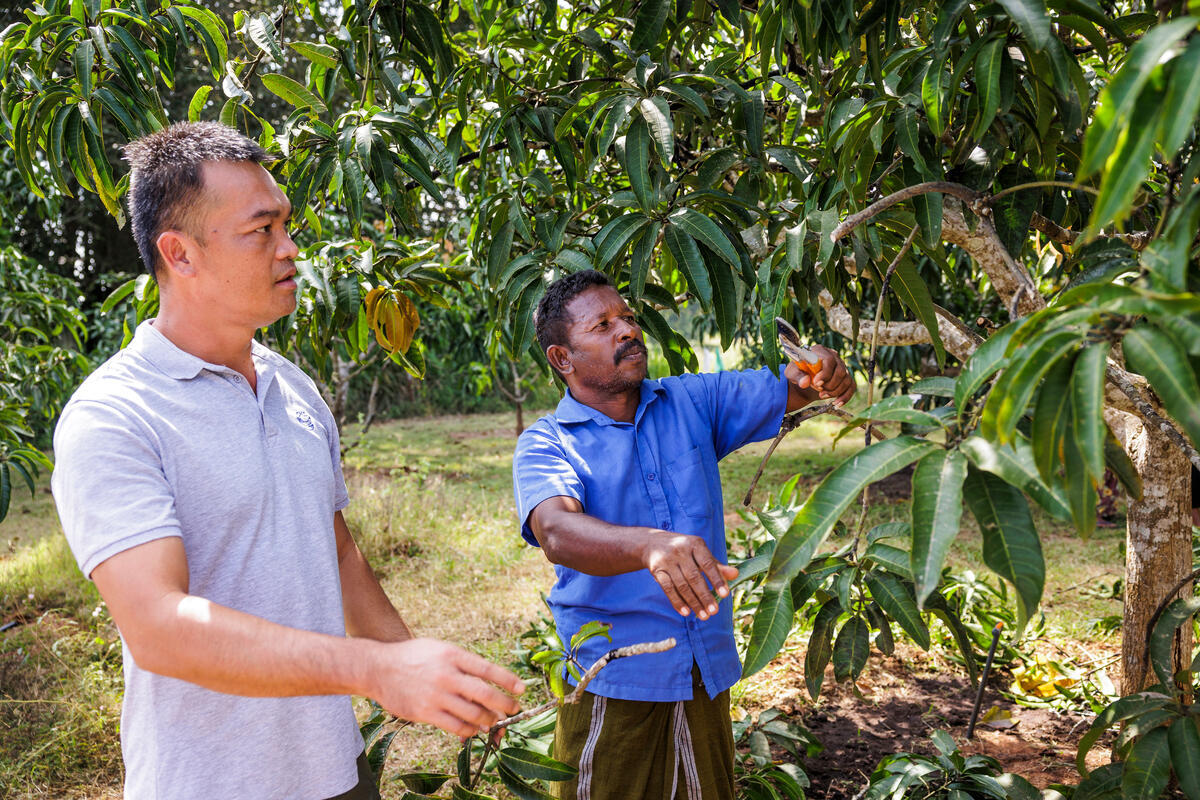 IMAGE 1 Nochchiyagama, Sri Lanka. LSM Dissanayake, a mango farmer, prunes one of his trees, under the supervision of Zengxian Zhao, a Chinese expert advisor on crop cultivation. Dissanayake is receiving Chinese agricultural expertise and technological support to improve his harvests.
IMAGE 1 Nochchiyagama, Sri Lanka. LSM Dissanayake, a mango farmer, prunes one of his trees, under the supervision of Zengxian Zhao, a Chinese expert advisor on crop cultivation. Dissanayake is receiving Chinese agricultural expertise and technological support to improve his harvests.
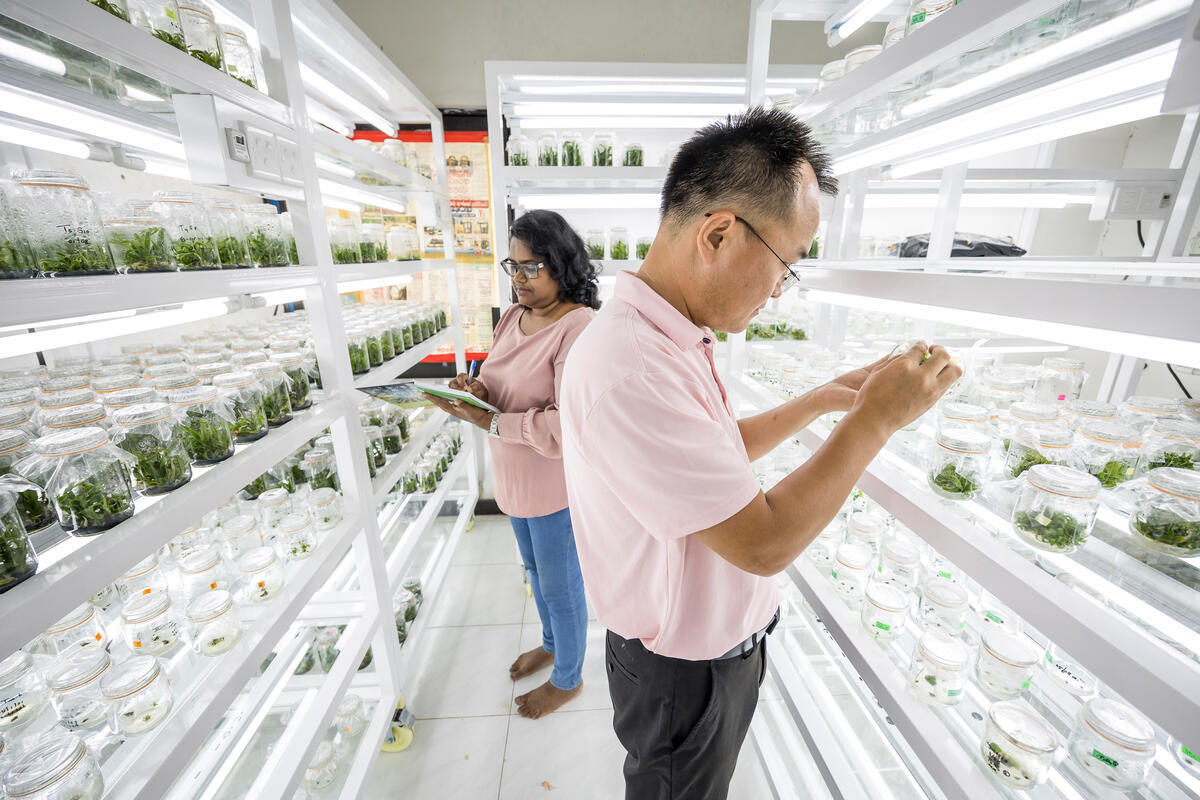 IMAGE 2Horana, Sri Lanka. Dr RNI Perera (L), Deputy Director of Research, FRDI, and Lijun Guo (R), a Chinese tissue culture expert advisor, examine banana and pineapple suckers in the culture room of the Food Research and Development Institute.
IMAGE 2Horana, Sri Lanka. Dr RNI Perera (L), Deputy Director of Research, FRDI, and Lijun Guo (R), a Chinese tissue culture expert advisor, examine banana and pineapple suckers in the culture room of the Food Research and Development Institute.
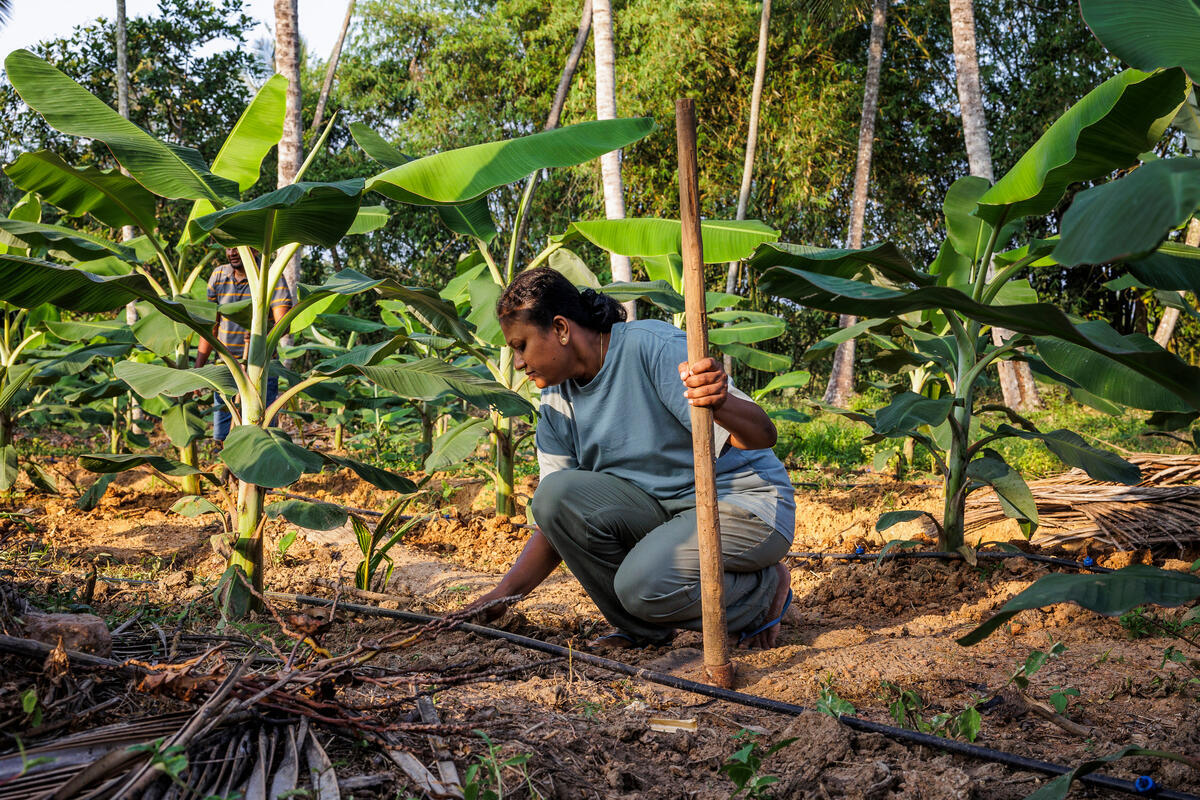 IMAGE 3 Makandura, Sri Lanka. Nimali Wijesooriya works on her banana farm. Nimali is receiving Chinese agricultural expertise and technological support to improve her plantation’s yields.
IMAGE 3 Makandura, Sri Lanka. Nimali Wijesooriya works on her banana farm. Nimali is receiving Chinese agricultural expertise and technological support to improve her plantation’s yields.
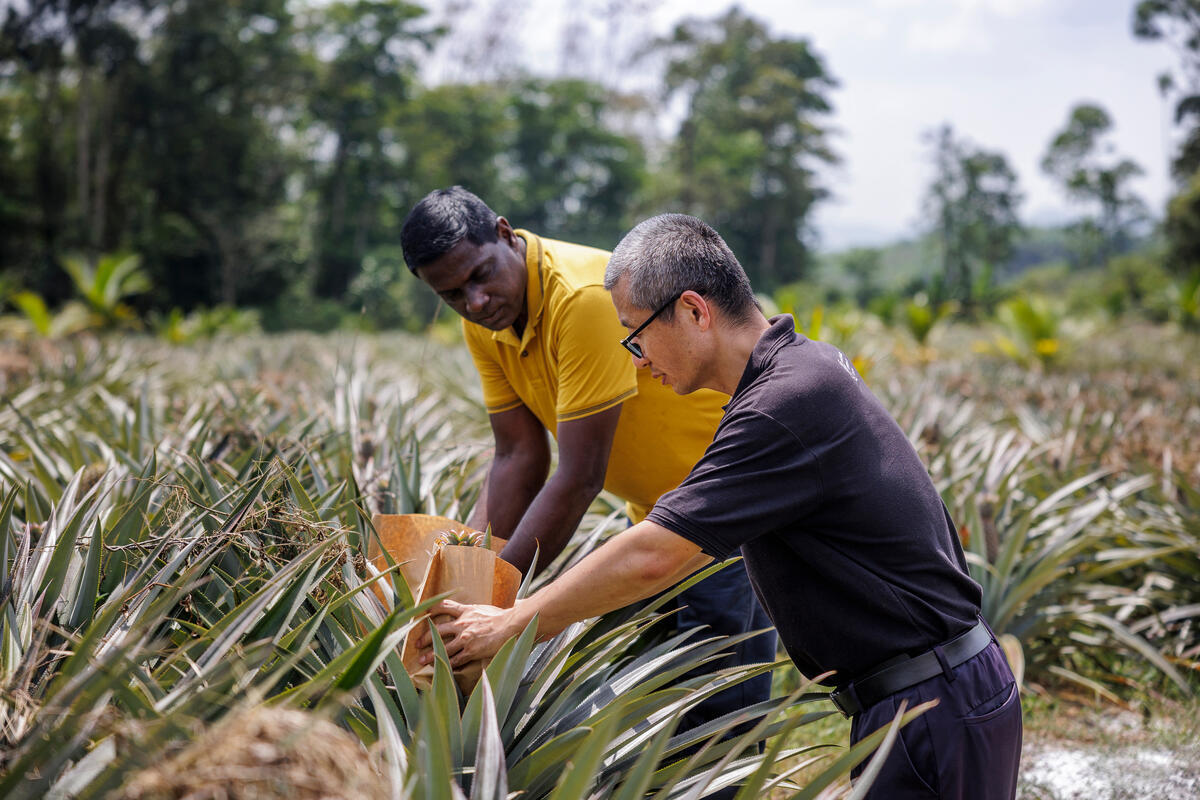 IMAGE 4 Horana, Sri Lanka. BHS Lakmal (L), a pineapple farmer, and Jifeng Li (R), a Chinese agriculture expert advisor, cover pineapples with paper protection against pests and the elements, as the fruit approach harvest time.
IMAGE 4 Horana, Sri Lanka. BHS Lakmal (L), a pineapple farmer, and Jifeng Li (R), a Chinese agriculture expert advisor, cover pineapples with paper protection against pests and the elements, as the fruit approach harvest time.
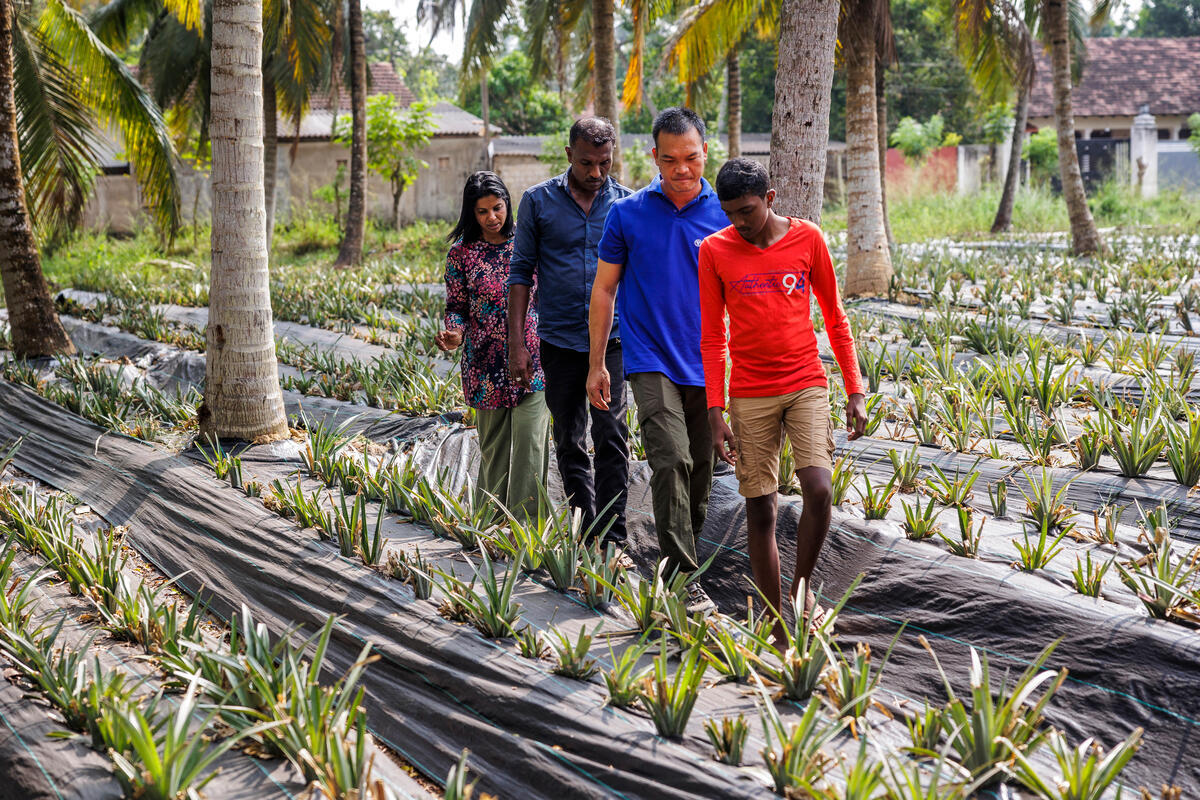 IMAGE 5Makandura, Sri Lanka. (L-R) Dr Darshani Jayamanne, an agronomist, and Additional Director of the pineapple Research Centre, Krishan Poorna, a pineapple farmer, Zengxian Zhao, a Chinese crop cultivation expert, and Poorna’s 13-year-old son, Thuhan, inspect the family fields. Poorna has just begun receiving Chinese agricultural expertise and technological support to improve his farm’s yields.
IMAGE 5Makandura, Sri Lanka. (L-R) Dr Darshani Jayamanne, an agronomist, and Additional Director of the pineapple Research Centre, Krishan Poorna, a pineapple farmer, Zengxian Zhao, a Chinese crop cultivation expert, and Poorna’s 13-year-old son, Thuhan, inspect the family fields. Poorna has just begun receiving Chinese agricultural expertise and technological support to improve his farm’s yields.
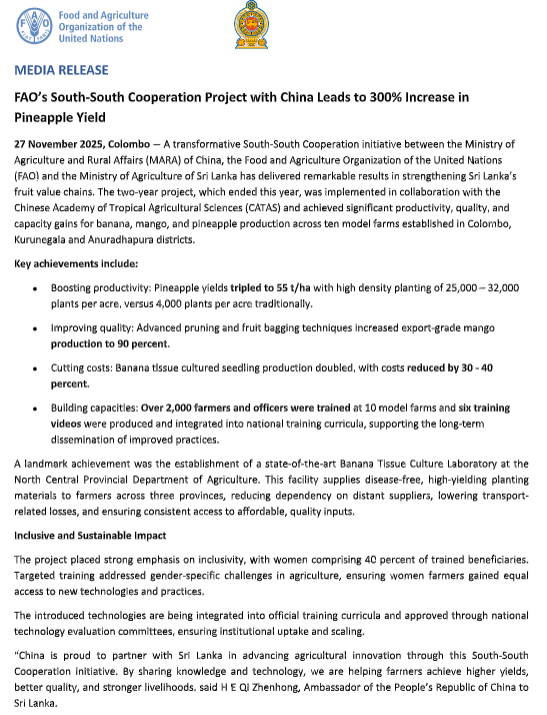
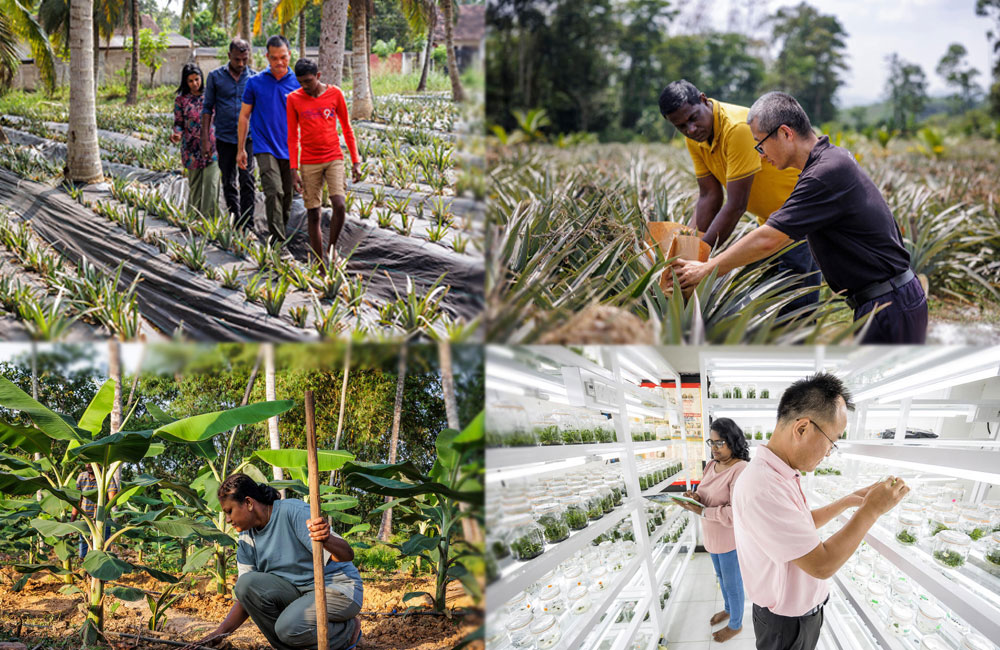
Leave your comments
Login to post a comment
Post comment as a guest